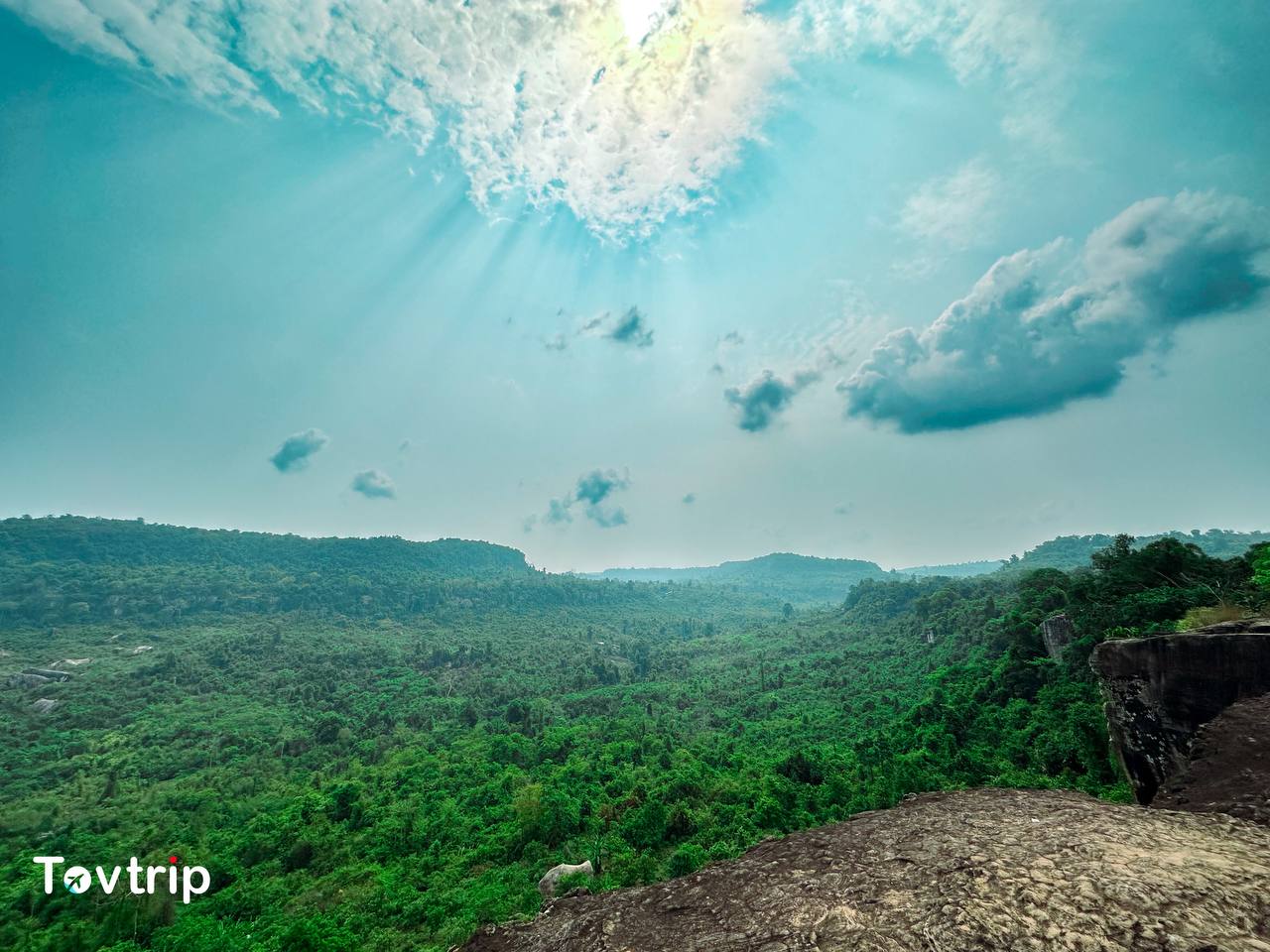
ប្រាសាទបេងមាលា(Beng Mealea)
-
 By
Local-guide N003
By
Local-guide N003
- Date 02 Jun 2023
ប្រាសាទបេងមាលា មានទីតាំងស្ថិតនៅភូមិបេងមាលា ស្រុកស្វាយលើ ខាងកើតជើងភ្នំគូលេន ខាងកើតប្រហែល ៧៧គីឡូម៉ែត្រពីក្រុងសៀមរាប។ប្រាសាទបេងមាលា មានលក្ខណៈស្រដៀងនឹងប្រាសាទអង្គរវត្ត និងត្រូវបានស្ថាបនាឡើងដោយព្រះបាទសូរ្យវរ្ម័នទី២ ហើយត្រូវបានសាងសង់នៅចុងសតវត្សទី ១១និងដើមសតវត្សទី១២ លើផៃ្ទដីទំហំ ១៤ហិកតា ។ដើម្បីឧទ្ទិសថ្វាយដល់ព្រះអាទិទេពក្នុងព្រហ្មញ្ញសាសនា និកាយវិស្ណុនិយម ប្រាសាទនេះកសាងឡើងដើម្បីឧទ្ធិសថ្វាយព្រះវិស្ណុដោយមានកសិណទឹក (គូទឹក)ព័ទ្ធជុំវិញរាប់គីឡូម៉ែត្រខណ្ឌទីតាំងប្រាសាទ ឲ្យក្លាយជាកោះមួយនោះដូចេ្នះប្រាសាទបេងមាលាក៏ត្រូវតែមានន័យដូចគ្នាដែរ។ សព្វថ្ងៃប្រាសាទនេះបានទាក់ទាញភ្ញៀវទេសចរជាតិនិងអន្តរជាតិចូលមកទស្សនាយ៉ាងច្រើនកុះករដែរនៅតំបន់នោះមានដើមឈើតូចធំជាច្រើនដុះហែហមតម្រៀបគ្នាជាជួរ ហាក់ដូចជារង់ចាំទទួលដំណើរការមកដល់របស់ភ្ញៀវទេសចរអញ្ចឹង។ ដើមឈើទាំងនោះបានផ្ដល់នូវម្លប់ត្រជាក់យ៉ាងត្រឈឹងត្រឈៃ ផងដែរ។
Around 77 kilometers east of Siem Reap, in the Beng Mealea Village of the Svay Leu District, east of the foothills of Kulen, is where you'll find the Beng Mealea Temple. King Suryavarman II constructed the Angkor-style Beng Mealea Temple. On a 14-hectare site, it was constructed in the late 11th and early 12th centuries. With a water tank (moat) around the temple for many kilometers, turning the location of the temple into an island, this temple was constructed to be dedicated to the deity in Brahmanism, the Vishnu sect. As such, the Beng Mealea temple must also have the same meaning. Currently, a sizable number of domestic and foreign tourists visit the shrine. There are numerous tiny and large trees growing in rows nearby, seemingly anticipating the coming of travelers. The trees also cast a refreshing shade.
Read More

លានជល់ដំរី (Terrace of the Elephants)
-
 By
Local-guide N003
By
Local-guide N003
- Date 02 Jun 2023
លានជល់ដំរីជាលានមួយដែរស្ថិតនៅខាងមុខនៃគោបុរៈខាងកើតនៃកំពែងព្រះបរមរាជវាំងស្ថិតនៅជាប់លានស្តេចគំលង់។លានជល់ដំរីនេះត្រូវបានសាងសង់ឡើងក្នុងរជ្ជកាលព្រះបាទជ័យវរ្ម័នទី៧ នៅចុងសតវត្សទី១២នៃគ្រិស្តសករាជនៅទីនេះមានរូបចម្លាក់ដំរី និងហ្មរជាច្រើន។ រូបនោះបង្ហាញពីដំរីដែលប្រើប្រាស់ប្រមោយដើម្បីប្រមាញ់ និងប្រយុទ្ធជាមួយនឹងខ្លា។ លាននេះមានប្រវែងប្រហែល ៣៥០ម៉ែត្រ ចាប់ពីប្រាសាទបាពួន ដល់លានស្តេចគំលង់។ លាននេះមានរានហាលចំនួនបីនិងមានពីរជាន់។ ជណ្ដើរឡើងខាងត្បូង អមសងខាងដោយដំរីក្បាល៣កាន់ផ្កាឈូកនៅប្រមោយរបស់វា។ ជណ្ដើរឡើងកណ្ដាល លំអដោយផ្ទាំងចំលាក់សិង្ហនិងគ្រុឌឈរទ្រជណ្ដើរ។ លាននេះត្រូវបាន ព្រះបាទជ័យវរ្ម័នទី៧ ប្រើប្រាស់ជាវេទិកា ពីការវិលត្រលប់នៃកងទ័ពរបស់ ព្រះអង្គ ដែលបានទទួលជ័យជំនះពីសង្គ្រាម។
In addition to the Leper King Terrace, there is also the Elephant Terrace in front of the Royal Palace's eastern gopura. The Elephant Terrace was constructed in the late 12th century AD, during the reign of Jayavarman VII. There are numerous elephant and Khmer statues in this area. The image depicts an elephant fighting and hunting tigers with its trunk. From the Baphuon temple to the Leopard King terrace, this terrace is approximately 350 meters long. The terrace comprises two stories and three porches. Southbound stairs with three-headed elephants carrying showers at their trunks on either side. Lion and garuda statues may be seen on the main staircase. Jayavarman VII used this terrace as a staging area for the retreat of his troops after the battle.
Read More

លានស្តេចគំលង់(Lean Sdach Kumlung)
-
 By
Local-guide N003
By
Local-guide N003
- Date 02 Jun 2023
លានស្តេចគំលង់ ឬព្រះលានស្តេចគំលង់ ជាលានមួយដែរស្ថិតនៅចន្លោះផ្លូវពីប្រាសាទបាយ័នទៅទ្វារដីឆ្នាំង នៅខាងធ្វេងដៃជាប់ខាងជើងលានជល់ដំរី។លានស្តេចគំលង់ ឬព្រះលានស្តេចគំលង់ ត្រូវបាន ស្ថាបនាឡើងមានគ្រឹះប្រវែង ២៥ម៉ែត្រ និង មានកំពស់ ៦ម៉ែត្រ។ ឈ្មោះនៃលាននេះគឺយោងទៅ តាម រូបសំណាក់ស្តេចគំលង់ ដែលគង់នៅលើរានហាល នៃលាន។ រូបសំណាក់នេះអង្គុយលុតជង្គង់ខាងស្តាំ។ រូបសំណាក់សព្វថ្ងៃនេះជា រូបចំលងទេ រីឯរូបពិតគឺត្រូវបានដាក់តាំងនៅ ក្នុងសារមន្ទីរជាតិនៅទីក្រុងភ្នំពេញ។ លានស្តេចគំលង់ ឬព្រះលានស្តេចគំលង់ បានទាក់ទាញភ្ញៀវទេសចរយ៉ាងច្រើនកុករអោយចូលមកទស្សនាស្ទើតែជារៀងរាល់ថ្ងៃ ។ ភាពទាក់ទាញរបស់លាននេះគឺ ចម្លាក់ក្បូក្បាច់ និង ប្រវត្តិនៃការសាងសង់ ទីតាំង និងរចនាបទផ្សេងៗដែលពាក់ពាន់នៅលាននេះផងដែ៕
North of the Elephant Terrace, between the road leading from Bayon Temple and the pottery gate, lies another terrace known as the Leopard King Terrace. The statue of the leper king on the terrace's porch inspired the name of the terrace. The statue that is on display now is a reproduction; the original is housed in Phnom Penh's National Museum. Nearly every day, a sizable number of people come to see the Leopard King Terrace. The sculptures, construction history, setting, and diverse fashions worn on this terrace all contribute to the terrace's appeal.
Read More

រមណីយដ្ឋានភូមិវប្បធម៌កម្ពុជា(Cambodian Cultural Village)
-
 By
Local-guide N003
By
Local-guide N003
- Date 02 Jun 2023
រមណីយដ្ឋានភូមិវប្បធម៌កម្ពុជា ជារមណីយដ្ឋានទេសចរណ៍បែបធម្មជាតិកែច្នៃ រមណីយដ្ឋាននេះមានទីតាំងស្ថិតនៅក្នុងភូមិគ្រួស ឃុំស្វាយដង្គំ ស្រុកសៀមរាប ដែលមានចំងាយប្រមាណជា ៣គីឡូម៉ែត្រ ពីទីរួមខេត្តសៀមរាប នៅទីនេះមានសក្តានុពលទេសចរណ៍សំខាន់ៗយ៉ាងច្រើនដែរបានទាក់ទាញភ្ញៀវទេសចរអោយចូលមកទស្សនដែរក្នុងនោះមានដូចជា ភូមិវប្បធម៌ជាកូនភូមិគំរូមួយដែលមាន សំណង់ផ្ទះ និងអគារប្រវត្តិសាស្រ្ដដែរបានបង្ហាញនូវទំនៀមទម្លាប់របស់ប្រជាជនខ្មែរ និងជីវភាពរបស់ជនជាតិទាំងអស់ ។ នៅទីនេះ ភ្ញៀវទេសចរអាចមកលំហែកម្សាន្ត ទស្សនាការសម្តែងផ្សេងៗជាច្រើនព្រមទាំងមានក្នែងថតរូបស្អាតៗថែមទៀតផង៕
Resort in Kampuchea Culture Village Around 3 kilometers from Siem Reap, this resort is situated in Krous Village, Svay Dangkum Commune, Siem Reap District. Several significant tourist potentials exist. Cultural villages, model villages with dwellings, and historic structures that depict the customs of the Khmer people and the lives of various ethnic groups all served to draw tourists to the area. Tourists can unwind, enjoy a variety of activities, and take stunning photos here.
Read More

ភ្នំគូលែន(Phnom Kulen)
-
 By
Local-guide N003
By
Local-guide N003
- Date 17 May 2023
ភ្នំគូលែនជាភ្នំមួយដែរមានទីតាំងស្ថិតនៅក្នុងស្រុកស្វាយលើនិងស្រុកវ៉ារិនចំងាយ៦០គីឡូម៉ែត្រពីក្រុងសៀមរាបនិងប្រហែល២៥គីឡូម៉ែត្រពីប្រាសាទបន្ទាយស្រី។ ភ្នំគូលែនឬមានឈ្មោះជាផ្លូវការ“ឧទ្យានជាតិព្រះជ័យវ័រ្មននរោត្តម ភ្នំគូលែន”ភាគច្រើនភ្ញៀវទេសចរដែលមកទស្សនាខេត្តសៀមរាប កម្រនឹងរំលងរមណីយដ្ឋានទេសចរណ៍បែបធម្មជាតិ និងប្រវត្តិសាស្រ្តមួយនេះណាស់។ ហើយភ្នំគូលែនមានឈ្មោះដើមថា មហិន្រ្ទព៌ត ជាទីតាំងសក្ការៈមួយ និងជាទីកន្លែងដែលមានភាពល្បីល្បាញផ្នែកវប្បធម៌ប្រវត្តិសាស្រ្ត និងជារាជធានីដំបូងគេនៃអាណាចក្រអង្គរ ដែលតំណាងឲ្យសុខសន្តិភាព និងការបង្រួបបង្រួមជាតិ បន្ទាប់ពីអាណាចក្រខ្មែរបានចាកផុតពីការគ្រប់គ្រងរបស់ពួកជ្វា។នៅលើភ្នំគូលែនគឺសម្បូរទៅដោយប្រាសាទបុរាណជាច្រើនបានលាក់ខ្លួននៅក្នុងព្រៃនៃភ្នំនេះ។ នៅទីនេះ ភ្ញៀវទេសចរទាំងអស់ក៏អាចមុជទឹកលេងកម្សាន្ត ជាមួយនឹងទឹកធ្លាក់ដែលត្រជាក់ដូចទឹកអម្រឹត និងនៅលើកំពូលភ្នំមានវត្តតូចមួយដែលមានដំកល់បដិមាព្រះពុទ្ធរូបមួយអង្គ ទំរេតព្រះកាយដែលឆ្លាក់ចេញពីផ្ទាំងថ្មភ្នំតែម្តង។
Phnom Kulen is a mountain in Svay Leu and Varin districts, 60 kilometers from Siem Reap and about 25 kilometers from Banteay Srei temple. Phnom Kulen, officially "Preah Jayavarman Norodom Phnom Kulen National Park," is a natural and historical resort that most tourists who visit Siem Reap do not miss. And Phnom Kulen, formerly Mahindrapot, is a place of worship and is famous for its culture and history. It was the first capital of the Angkorian Empire, representing peace and national unity after the Khmer Empire fell under the control of the Javanese. Mount Kulen is rich in ancient temples hidden in the mountain's forest. Tourists can also swim in the waterfall, which is as cold as Amret water, and there is a small pagoda on top of the mountain with a statue of the Buddha lying on the body carved from the rock.
Read More
Showing 46 - 50 of 105 posts

